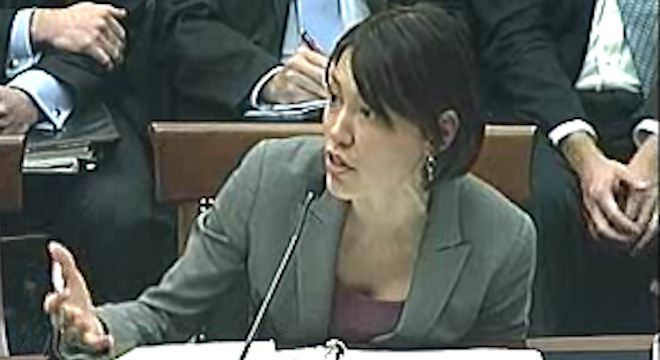The controversial House hearing over the proposed Stop Online Piracy Act on Wednesday was criticized in advance for featuring only one witness against the legislation: a representative from Google.
But Katherine Oyama, Google’s policy counsel, certainly made the most of her time in front of lawmakers, arguing that as written, the SOPA legislation would infringe upon Americans’ Constitutionally-protected Free Speech rights and would make the Internet less secure for all users.
“We are concerned that the bill sets a precedent in favor of Internet censorship and could jeopardize our nation’s cybersecurity,” Oyama said in her prepared statement.
In addition, Oyama posted a hypothetical scenario of a small business owner with a website that functions as a storefront for products made by other small businesses. Ninety-nine percent of the sellers on this website are legitimate, but one seller has begun selling “counterfeit handbags and T-shirts that parody famous copyrighted logos.” Oyama’s point was that even if this small businesses complied with current law used to crack down on pirate websites (the Digital Millennium Copyright Act, or DCMA), under SOPA, the website could be deemed “dedicated to theft” and eligible for a takedown.
“Facing these potential risks, perhaps you would think twice about establishing your business in the first place,” Oyama said in her prepared remarks.
Yet it was in the question-and-answer section of the hearing that Oyama really fought back against SOPA.
“Would you consider it unconstitutional to for law enforcement to seize a child pornography site that contains one copy of the King James Bible?” asked Rep. Mel Watt (D-NC), countering Oyama’s hypothetical example with an analogous one.
“We agree with Floyd Abrams that you need to look at the whole site,” said Oyama, referring to the pro-SOPA letter from the famed First Amendment lawyer, who wrote to the committee on behalf of a collection of entertainment industry groups, including the Directors Guild of America.
Pressed again for a “yes” or “no” answer, Oyama answered, “We would not agree with the scope of a definition that sweeps in ‘a totally infringing site.’ We would support a definition that was more narrowly drawn.”
Oyama said that Google and the other tech companies it had been in conversation with about the legislation were particularly concerned with the definition of a U.S. website “dedicated to theft of property,” which is defined in section 103 of the bill as “an Internet site, or a portion thereof, that “is primarily designed or operated for the purpose of, has only limited purpose or use other than, or is marketed by its operator or another acting in concert with that operator for use in” piracy or “the operator of the U.S.-directed site…is taking, or has taken, deliberate actions to avoid confirming a high probability of the use of the U.S.-directed site to carry out acts” of priacy.
“Nobody [in the tech community] understands what this means,” Oyama said.
Instead, Google and other tech companies are advocating that lawmakers go back to the drawing board and create new legislation that would restrict the government to going after payment providers and other sources of revenue for infringing websites, such as advertisements. Oyama repeatedly referred to the success that the U.S. government has had in crippling Wikileaks, pointing out that the organization is now on perilous financial ground and has been rendered basically ineffective after PayPal and Mastercard cut off support for processing donations to the whistleblower website in December 2010.
“Cutting off funding sources worked in the case of Wikileaks,” Oyama said. “If you go to the Wikileaks website today you see they are saying they are going down because thier payment providers have cut them off.”
As for the security issue, Oyama told lawmakers that they should reconsider the provision of the bill that would require Internet service providers (ISPs) to perform domain name service (DNS) blocking of websites accused of facilitating piracy (DNS blocking is when an ISP removes the record of the numeric address of the website from their servers, surfacing a blank page instead of the intended web page.)
“This provision would harm the U.S. and global efforts to make DNS more secure,” Oyama said. “We know users are seeking this [pirated] material. We can predict circumvention efforts, users will reroute their traffic to offshore servers, which will expose them” to malware and other security threats.
The hearing concluded around 1:30 am ET. Stay tuned for a rundown of the arguments and testimony from those in favor of the bill.









